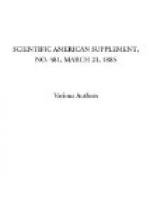This was an experiment on the part of the British Association. Discussions, as a rule, have not been the case at our meetings. Papers have been read and papers have been discussed; but on this occasion three or four subjects were named as fit for discussion, and distinguished professors were selected to open the discussion.
On this particular subject, Professor Oliver Lodge opened the discussion, and he did so in an original, an efficient, and in a chirpy kind of manner that took by storm not only the professors who knew him, but those who did not know him; and I am bound to say that I do not think we could possibly better spend an evening during the coming session, or more profitably, than by asking Professor Oliver Lodge to bring the subject before this Society, so as to allow us on this side of the water to discuss the same subject.
Of course the prominent figure at our meetings was Lord Rayleigh; and I do not think that any person could possibly have been present at those meetings of the British Association without feeling an intense personal admiration for this man, and an affection for the way in which he maintained the position of an English gentleman and the credit of an English scientific body, to the astonishment and delight of every one present. Then, again, we had our past President, Sir William Thomson, who was not quite so ubiquitous as usual; he did not dance from section to section as he usually does, but remained as president of his own section, A. I think he only left his section for a day, and that was to attend the electrical day in Section G; but in his own section he brought down those words of wisdom that one always hears from him, and which make one always regret that there is not always present about him a shorthand writer to take down thoughts and ideas that never occur again, and are only heard by those who have the benefit of being present.
The subjects brought forward were not of intense interest. We had a paper by Dr. Traill, describing the Portrush Railway, and there were various other papers; and I can pass over some of the other subjects, because I shall have to deal with them under another head. But while we were in Montreal, a deputation of American professors and members of the American Association came over, and invited a good many of those who were present at Montreal to visit the American Association at Philadelphia. I was one of those who went over to America simply and solely for a holiday, and I am bound to say that I set my face determinedly against going to Philadelphia. I traveled with two charming companions, and we all decided not to go to Philadelphia. But the compact was broken, and we capitulated, and went from the charming climate of Montreal into the most intense heat and into the greatest discomfort that I think poor members of the Telegraph Engineers’ Society ever experienced. We entered a heat that was 100 deg. by day and 98 deg. by night; and I do not think there is anybody in this room, unless he has been brought up in the furnace-room of an Atlantic steamer, who can fully appreciate the heat of Philadelphia in these summer months. The discomforts of the climate were, however, amply compensated for by the hospitality and kindness of the inhabitants. We spent, in spite of the heat, a very pleasant time.




